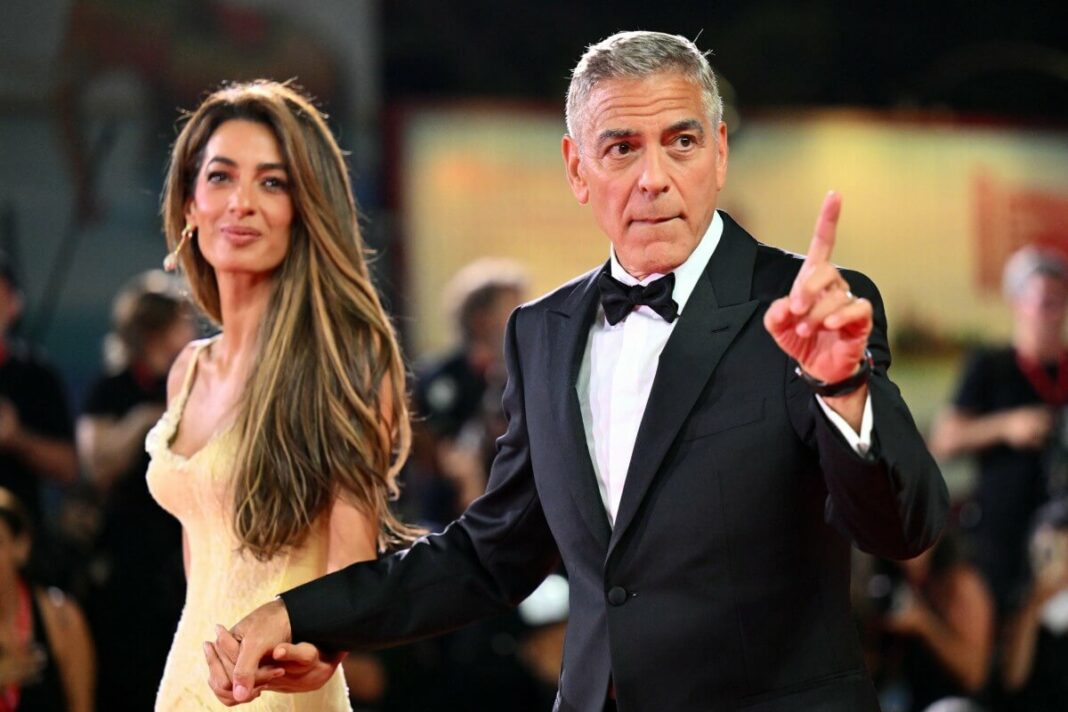The Clooney Foundation for Justice, co-founded by American actor George Clooney and his human rights lawyer wife, Amal, is among a number of rights organizations that have been granted the status of a third-party intervener in a new case concerning jailed businessman Osman Kavala at the European Court of Human Rights (ECtHR), Deutsche Welle Turkish service reported.
The lawyers for Kavala, who has been in prison since November 2017 and not released despite ECtHR decisions in his favor, filed a second application at the ECtHR in January due to his conviction in the Gezi Park trial, which they said is filled with many rights violations.
Kavala was sentenced to life in prison in 2022 for allegedly attempting to overthrow the government of President Recep Tayyip Erdoğan. His conviction, seen as politically motivated by many, was upheld by the Supreme Court of Appeals in September 2023.
Local and international rights organizations and advocacy groups such as the Turkish Bar Association, the Freedom of Expression Foundation, Human Rights Watch, the International Commission of Jurists and the Clooney Foundation for Justice applied to the ECtHR seeking a third-party intervention in Kavala’s new case.
The Strasbourg-based court has accepted these organizations’ request to become third-party interveners, which will enable them to convey their views on the Kavala case to the court.
Third-party intervention under Article 36 § 2 of the European Convention on Human Rights (ECHR) is a procedural device whose chief purpose is to enable the ECtHR to become acquainted with the views of states and other persons who are not parties to a case before it on the issues raised by that case, and be presented with information or arguments that are broader than or different from those put forward by the parties.
Such intervention can take place either at the initiative of the court itself or at the initiative of the would-be third party.
Clooneys support Kavala
The participation of the Clooney Foundation for Justice in the Kavala application is likely to bring more attention to the case, which is closely followed by the international community.
The Clooney Foundation for Justice, established in 2016, provides free legal support to victims of human rights abuses in over 40 countries around the world. The foundation’s programs aim to fight systemic injustice against vulnerable communities: journalists, women and girls, democracy defenders, LGBTQ+ persons and minorities, according to its website.
Among the foundation’s donors are the Bill & Melinda Gates Foundation, Charlotte Tilbury Beauty, the Ford Foundation, Microsoft and the Versace Foundation.
Turkey alleges that Kavala had a leading role in anti-government protests in 2013 that began in İstanbul’s Gezi Park. In its 2019 judgment, the ECtHR held that Kavala was prosecuted and held in pretrial detention since November 2017 on the basis of his human rights activities. The court found that the Turkish authorities had pursued the ulterior motive of silencing Kavala as a human rights defender and that by using detention for political ends, Turkey had violated Kavala’s right to liberty and security (Article 5) as well as the prohibition on restricting ECHR rights for purposes other than those allowed under the the ECHR’s Article 18.
Infringement procedure against Turkey
The non-implementation of the ruling prompted the Council of Europe (CoE) Committee of Ministers to launch an infringement procedure against Turkey in February 2022, which is still ongoing.
The Coe Committee of Ministers is expected to review Turkey’s non-compliance with the ECtHR decision on Kavala during its upcoming meeting September 17-19.
Meanwhile, the ECtHR, which examined Kavala’s second application on a priority basis, informed Turkey in March about the application and asked the Turkish government to submit its defense to the court by July 16.
Since Turkey said it was unable to present its defense by this date, it asked for extra time, and the court set September 16 as the new deadline for Turkey to make its defense.
The infringement procedure against Turkey could potentially see Ankara expelled from the continent’s leading human rights organization.
A leading figure in Turkey’s civil society, 66-year-old Kavala was born in Paris, educated in the UK and ran a cultural center before being thrust to prominence.
Kavala’s conviction, along with those of other defendants in the Gezi Park trial, has been widely criticized as politically motivated and has drawn significant international condemnation and domestic protest.
